Hi there, I’m Chef Sarah Saimon—and if you’re here, you’re probably navigating a new phase in your wellness journey, maybe even with the help of Zepbound.
Let me tell you something I’ve learned after years of developing recipes for real clients working with GLP-1 medications like Zepbound or Mounjaro: the shot is just one part of the story. What you eat still matters—deeply.
That’s why I started building what I call natural Zepbound recipes—meals that aren’t just low in calories or trendy on TikTok, but that actually support what your body’s doing behind the scenes with this medication.
I’ve seen it happen over and over again: bloat goes down, energy goes up, cravings disappear—not because of the injection alone, but because the food finally matches the function.
In this post, I’m giving you my kitchen-tested, nutrient-rich, gut-loving recipe that’s helped clients stay full, satisfied, and in sync with their Zepbound plan. We’ll go beyond just “eat more greens” and dive into:
- What makes a Zepbound recipe work
- Which ingredients bring the most results
- How timing and pairing make the biggest difference
- And of course—my personal favorite recipe from the CrispCrave kitchen
Looking for more inspiration like this? Don’t miss our Zepbound Salad Recipe to see how functional flavor and fat-burning come together.
Want to explore the article content? Click here to see the table of contents!
Table of Contents
What Is a Natural Zepbound Recipe?
Understanding the connection between Zepbound and functional foods
Let’s clear this up right away: Zepbound is powerful, yes. It targets hunger and insulin regulation, slows digestion, and makes you feel full faster. But if your meals are still working against your hormones—too processed, too salty, or missing real fiber—you’re fighting an uphill battle.
I’ve seen clients plateau, feel nauseous, or even regain weight because they thought “Zepbound does the work.” No—your meals do the real work. Zepbound just gives your body space to catch up.
That’s where these natural Zepbound recipes come in.
They’re not about starving, counting every gram, or drinking meal replacements all day. They’re about:
- Feeding your gut the fiber it needs
- Keeping your blood sugar steady
- Using whole ingredients that help the medication work with your body—not against it
And yes, they taste good too. Because I’ve always said: if it’s not crave-worthy, it won’t stick.
How natural recipes complement GLP-1 medications like Zepbound
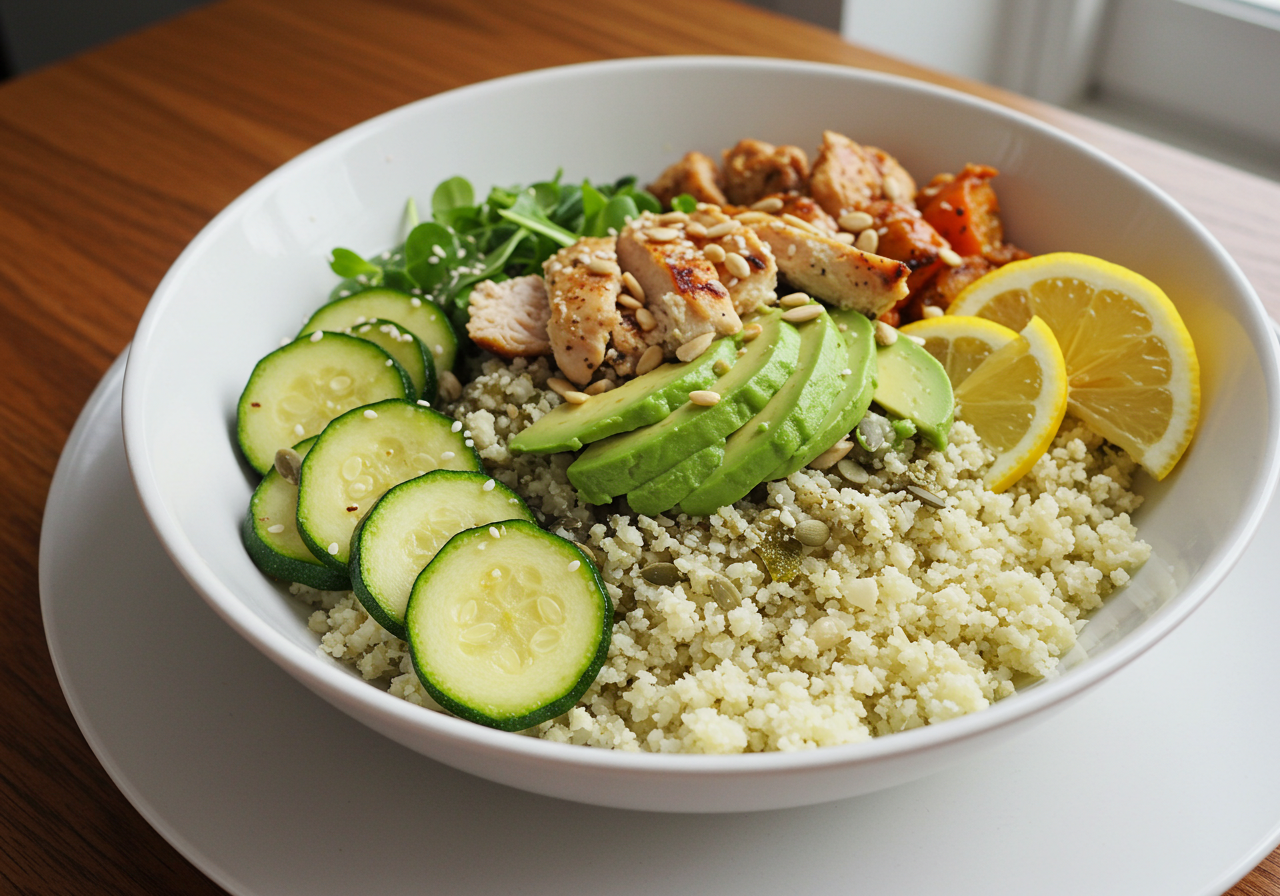
Natural Zepbound Detox Bowl
Ingredients
Equipment
Method
- Steam zucchini and sauté cauliflower rice until tender, not mushy.
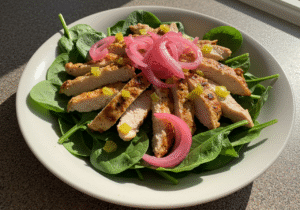
- Layer zucchini, cauliflower rice, and cucumber in a bowl.
- Top with grilled chicken, avocado slices, hemp seeds, and chopped parsley.
- Drizzle with lemon juice and olive oil. Add cumin and pink salt to taste.
- Optional: add tahini or turmeric vinaigrette before serving.
Nutrition
Video
Notes
I had a client—we’ll call her Rena—who came to me two weeks into her Zepbound journey. She was eating less, sure, but her energy was tanked, and she was miserable from bloating.
I took one look at her food journal and saw the issue: protein bars, ultra-light smoothies, not enough real greens or clean fat. Her meals weren’t nourishing—they were just “low.”
So we built a simple bowl together—zucchini noodles, grilled lemon chicken, avocado, and a turmeric vinaigrette. She called me 48 hours later, giddy: “I feel amazing. And I didn’t even snack once.”
That’s the magic of a well-built natural Zepbound recipe. It does more than feed you. It regulates you.
So whether you’re new to this journey or deep into week twelve, remember: food is still your strongest tool. And you’re about to learn how to use it right.
Benefits of a Zepbound-Friendly Diet
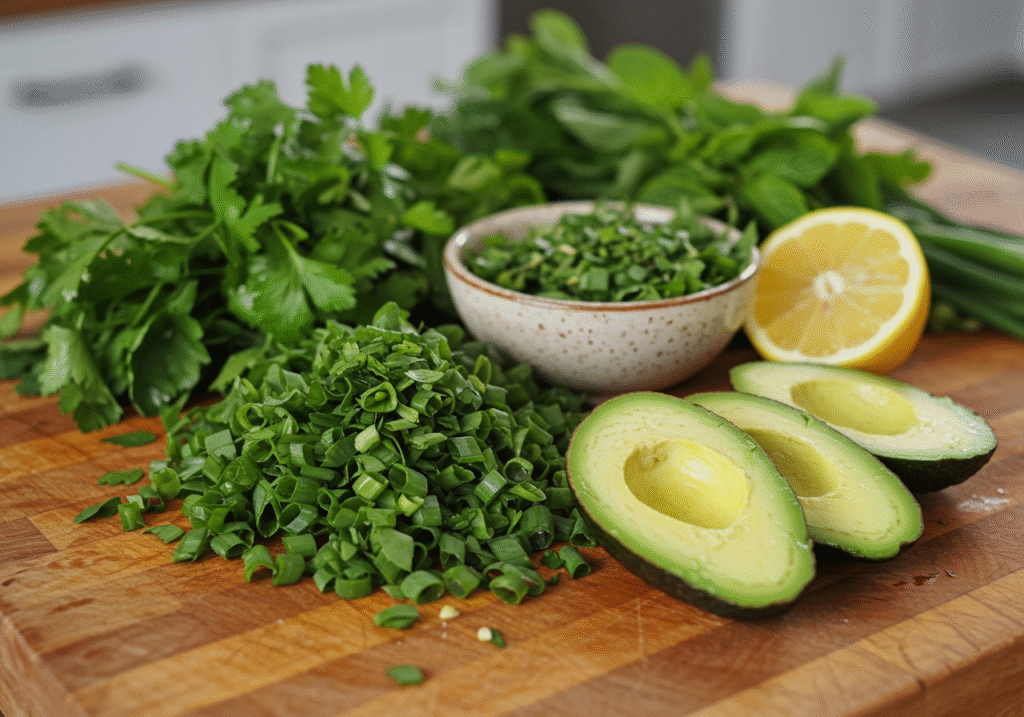
Why food matters on your Zepbound journey
I’ve cooked for hundreds of clients navigating weight loss and hormone shifts, and let me tell you—the ones who saw lasting changes weren’t just taking the injection… they were eating with intention.
Zepbound changes how your body handles insulin, hunger, and digestion. So, if you’re still eating food that spikes blood sugar or clogs your gut, you’re slowing your own progress.
That’s where a natural Zepbound recipe becomes your secret weapon.
Here’s what I see in my clients when we pair the right foods with Zepbound:
- Less bloating, even on injection days
- Faster fat adaptation (hello, scale victories)
- Clearer skin, steadier energy
- Fewer cravings between meals
I always say this: “The shot adjusts the signals. The food builds the results.”
What makes a recipe “natural” and GLP-1 supportive?
“Natural” gets tossed around a lot—so let me clarify what it means in my kitchen.
When I build a natural Zepbound recipe, I focus on ingredients that are:
- Whole – nothing ultra-processed, no mystery oils or gums
- Low-glycemic – to support the way Zepbound slows digestion
- Hydrating – because Zepbound can mess with fluid balance
- Anti-inflammatory – to reduce digestive and hormonal stress
Example: Instead of white pasta, we go for cauliflower rice. Instead of mayo, it’s Greek yogurt with lemon and dill. We still build flavor, just from ingredients that work with your body.
Here’s what’s always in rotation in my Zepbound client recipes:
| Category | Ingredients |
|---|---|
| Protein | Grilled chicken, tofu, soft-boiled eggs, wild salmon |
| Fiber | Zucchini, spinach, avocado, chia seeds |
| Good Fats | Olive oil, hemp hearts, tahini |
| Flavors | Fresh herbs, turmeric, lemon, cumin, parsley |
| Hydration | Cucumber, watermelon, peppermint tea, bone broth |
One client, Jess, used to crash every day at 2pm. Once we swapped her lunch to a Zepbound-style grain-free bowl with protein, greens, and healthy fats—her energy was steady through dinner.
Food isn’t the backup singer on your Zepbound journey. It’s the lead.
Want more low-inflammation food ideas? Don’t miss our Cauliflower Turmeric Weight Loss Soup —perfect for gentle digestion and flavor you’ll crave.
Key Ingredients in a Natural Zepbound Recipe
High-fiber, low-glycemic veggies and fruits
First things first: fiber is non-negotiable when you’re on Zepbound. Why? Because this medication slows gastric emptying, and without fiber to “move things along,” digestion can stall, bloat creeps in, and energy drops.
So, I load up my recipes with low-glycemic, fiber-rich produce that’s easy on the gut and full of hydration.
Here’s what I always keep in rotation:
- Zucchini noodles: light, filling, and versatile in bowls
- Cauliflower rice: great base, low-carb, gut-friendly
- Cucumber: supports water retention, cooling for the system
- Leafy greens: spinach, kale, arugula for magnesium and fiber
- Berries: when sweetness is needed, blueberries or blackberries do the job without a glucose spike
One of my clients actually said, “I didn’t realize how alive my body could feel until I added these greens every day.”
And she’s right—Zepbound is a catalyst. Fiber is the fuel.
Healthy fats, lean proteins, and anti-inflammatory spices
If I had a dollar for every time someone said, “I thought fat was bad on weight loss”, I could open another test kitchen.
Truth is, your hormones need healthy fats—especially when you’re using a GLP-1 med that alters your appetite and insulin response. These fats stabilize energy, feed your cells, and help your brain stay sharp.
Here’s my core fat + protein combo for Zepbound recipes:
Healthy Fats:
- Avocado
- Cold-pressed olive oil
- Hemp seeds
- Ground flax
- Tahini
Lean Proteins:
- Grilled lemon chicken (my favorite base)
- Tofu or tempeh for plant-based bowls
- Soft-boiled pasture-raised eggs
- Wild-caught salmon or sardines
And let’s not forget about flavor—because natural doesn’t mean boring. These are my go-to healing spices:
- Turmeric (anti-inflammatory)
- Cumin (great for digestion)
- Paprika (adds warmth and metabolism support)
- Fresh herbs: parsley, mint, cilantro—light and detox-friendly
Chef tip: I often use peppermint or parsley tea between meals to amplify digestion and keep the gut calm—especially helpful during early Zepbound weeks.
Want more hydration-based options for detox and gut reset? Check out our Peppermint Tea Detox Guide to pair with your meals.
My Go-To Natural Zepbound Recipe (Chef Sarah’s Signature Bowl)
Let me paint the picture: It’s a Sunday afternoon. I’ve got my knife set out, some calming music playing, and I’m batch-prepping my Zepbound Bowl—a clean, crisp combination that keeps me (and my clients) energized, bloat-free, and deeply nourished through the week.
This is the recipe I come back to over and over again. Why? Because it checks all the boxes:
- High in fiber
- Low in carbs
- Anti-inflammatory
- Packed with hydration
- Actually keeps you full
I’ve built this for clients balancing hormones, working on fat loss, or using GLP-1s like Zepbound—and they all say the same thing: “I don’t feel like I’m on a diet. I feel nourished.”
🥗 Chef Sarah’s Natural Zepbound Detox Bowl
Ingredients (1 serving – scale up as needed):
- ½ cup steamed zucchini ribbons or spiralized zucchini
- ½ cup cauliflower rice (lightly sautéed with garlic)
- ¼ avocado, sliced
- ½ cup grilled lemon chicken breast, chopped
- 1 tbsp hemp seeds
- ¼ cup chopped cucumber
- 1 tbsp fresh parsley, finely chopped
- Juice of ¼ lemon
- 1 tbsp extra virgin olive oil
- Pinch of pink salt and ground cumin
- Optional: 1 tsp tahini drizzle or turmeric vinaigrette
Instructions:
- Steam or sauté your zucchini and cauliflower rice until tender but not mushy. Set aside.
- Layer the base in your bowl: zucchini, cauliflower, cucumber.
- Add protein: Place the grilled chicken neatly in the center.
- Top with fats: Avocado, hemp seeds, and a drizzle of olive oil or tahini.
- Finish with lemon juice, parsley, and cumin for flavor and digestion.
- Toss gently and enjoy warm or chilled.
💡 Why It Works for Zepbound
This bowl was designed specifically to match the metabolism-slowing effect of Zepbound:
- Zucchini & cauliflower give bulk and fiber without carbs
- Hemp seeds & avocado support hormone balance
- Lemon, cumin, and parsley reduce water retention and support digestion
- Olive oil & tahini provide clean fats that don’t spike insulin
It’s light, but deeply satisfying. Cooling, yet warm with spice. I eat this bowl when I want to feel clear, light, and energized—especially on days I know I’ll be busy and don’t want to crash at 3PM.
✅ Looking for a post-meal sip that complements this bowl? Try our Mint Parsley Detox Tea for bloat relief and extra hydration.
When to Eat Your Natural Zepbound Meals
Timing your meals around injections for blood sugar balance
One of the first things I teach my Zepbound clients is this: your hunger cues are going to shift. You might go from feeling constantly snacky to barely hungry at all. But skipping meals or ignoring hunger completely? That’s where trouble starts.
Here’s the rhythm I’ve found most effective—with myself and with dozens of coaching clients:
Day of injection:
Your appetite may dip hard. This is normal. Don’t skip food entirely. Instead, focus on:
- Hydration early in the day (peppermint tea, cucumber water)
- A small protein-rich lunch (think: boiled egg + greens + avocado)
- A light, warm dinner with fiber and cooked veggies (like my signature Zepbound bowl)
Your body still needs fuel—even if your hunger is muted.
I always say: Don’t eat for hunger. Eat for recovery.
48–72 hours after injection:
This is where digestion can slow dramatically. I often see clients complain of:
- Bloating
- Constipation
- Low energy in the afternoon
This is the window where meal timing and balance matter most. Here’s my flow:
- Mid-morning meal (10am–11am)
Break your fast gently with warm tea and a small bowl—something like cauliflower rice, eggs, avocado, and herbs. - Afternoon meal (2pm–3pm)
This is your biggest meal. It should include all your macros: lean protein, fiber-rich greens, good fats. It’s when your gut is most active and glucose sensitivity is better. - Optional light dinner (6pm–7pm)
If you’re still full, skip it. But if you’re getting hungry, aim for a small soup or smoothie bowl.
Ideal eating windows to support fat metabolism and satiety
Zepbound naturally supports intermittent fasting windows (like 12:12 or 14:10), which is why I help clients narrow their eating to a 6–8 hour window most days.
Here’s one of my favorite patterns for fat-burning and bloat reduction:
| Time | Meal |
|---|---|
| 9:00 AM | Peppermint or dandelion tea (no food yet) |
| 11:30 AM | Natural Zepbound Bowl (protein + greens + fat) |
| 3:00 PM | Bone broth with turmeric, or light chia smoothie |
| 6:00 PM | Optional salad or broth-based soup (if hungry) |
And remember—water matters just as much as food. Aim for 2.5–3L per day, especially in the 3 days post-injection. This reduces retention and fatigue like magic.
Hydration and Gut Health on Zepbound
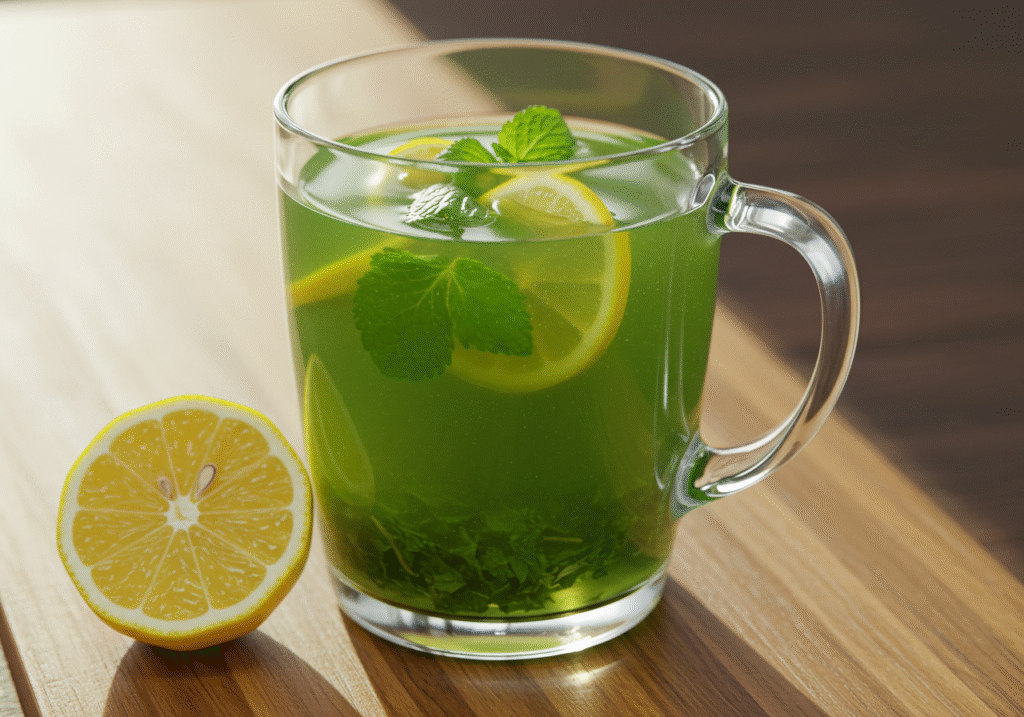
Importance of teas, detox drinks, and water-rich foods
Here’s something I always share with my Zepbound clients: the scale might not budge because you’re inflamed—not because you’re overeating. And often, that inflammation comes down to one thing—poor hydration.
Zepbound slows digestion. That means your body’s moving food through the gut more slowly, which can cause:
- Constipation
- Puffiness
- Headaches
- Low energy
The fix? Targeted hydration. Not just water—but liquids and foods that flush, balance, and gently stimulate the system.
These are the beverages I always keep in rotation on Zepbound-friendly meal plans:
| Drink | Purpose |
|---|---|
| Peppermint tea | Calms bloat, improves digestion, relieves nausea |
| Parsley-mint detox tea | Reduces water retention, supports kidney function |
| Lemon-cucumber water | Alkalizes and hydrates deeply |
| Bone broth with turmeric | Heals the gut lining and hydrates on a cellular level |
| Coconut water (unsweetened) | Replaces electrolytes naturally |
One of my favorite rituals: sipping peppermint tea with lemon 30 minutes after my Zepbound bowl. It feels like a spa for my belly.
Peppermint tea, parsley detox blends, and more
When I say “detox,” I’m not talking about extreme juice cleanses. I’m talking about everyday herbal rituals that keep your system moving and reduce the side effects of slower digestion.
Here’s my go-to gut reset tea (you might recognize it from the blog):
Mint Parsley Detox Tea (Client Favorite)
Ingredients:
- 10 fresh mint leaves
- 1 tbsp chopped fresh parsley
- Juice of ½ lemon
- 8–10 oz hot water
- Optional: 1 tsp raw honey
How to use:
Sip this between meals, especially in the first 48 hours after your injection. It relieves bloating, supports the kidneys, and eases fluid retention.
I’ve had clients report they lost inches of bloat in just 3 days by combining this tea with structured meals and Zepbound.
Want to add more clean, hydrating recipes to your rotation? Don’t miss our Healthy Ideas for sippable, satisfying ways to beat belly bloat.
Common Mistakes to Avoid in Natural Zepbound Recipes
Overdoing fats or carbs
Let’s get this out of the way: yes, healthy fats are essential on Zepbound. But more isn’t always better.
One of my clients—who was doing everything “right” with olive oil, avocado, and seeds—was still feeling sluggish and not seeing results. When we reviewed her bowl, she was stacking fat on fat: tahini dressing and avocado and olive oil and hemp seeds. That’s a lot.
The fix: Pick 1–2 fats per meal. That’s it.
Example: Avocado + lemon-olive oil = ✔️
Avocado + tahini + seed mix + vinaigrette? Too much.
Same goes for carbs. Zepbound slows your carb digestion, which means:
- Refined carbs hang around longer
- Blood sugar stays higher, longer
- Cravings can sneak back in even when appetite is low
Avoid these:
- Gluten-heavy grains (pasta, bread)
- White rice
- Snack bars and “low-carb” chips
Swap in:
- Cauliflower rice
- Zucchini noodles
- Quinoa in small portions
- Chia or flax for fiber
Pro tip: If it comes in a wrapper, it’s probably not Zepbound-friendly. Choose foods your great-grandmother would recognize.
Ignoring sodium and water retention
This one hits home. I had a client once who gained three pounds overnight and thought she was failing Zepbound. The truth? It was salt.
With slower digestion and altered kidney function, your body holds onto water more easily. Sodium from packaged sauces, condiments, and even “healthy” frozen meals can silently derail your progress.
What to watch:
- Store-bought dressings
- Chicken broth with added salt
- Sauces like soy, sriracha, or BBQ
What to use instead:
- Fresh lemon juice
- ACV + olive oil dressings
- Herbs and spices (cumin, turmeric, parsley, paprika)
One of my favorites: a lemon-turmeric vinaigrette made with olive oil, ground turmeric, Dijon mustard, and a dash of water. Bright, bloat-free flavor.
Skipping fiber or greens
This one’s sneaky. You’re eating less. You’re not hungry. So you think, I’ll just have a protein bar and move on.
Nope. Zepbound requires fiber to function smoothly. Without it:
- You’ll get constipated
- Your gut bacteria weaken
- Detox slows down
- Cravings creep back in
Every natural Zepbound recipe should include at least one of these:
- 1 cup raw greens (spinach, arugula, romaine)
- ½ cup cooked fiber veg (zucchini, cauliflower, asparagus)
- 1 tbsp chia, flax, or hemp seeds
Think of fiber as your internal broom—sweeping, stabilizing, balancing.
Don’t make these mistakes alone—discover more smart swaps and gut-friendly meals in our Zepbound Salad Recipe. It’s one of the most loved recipes in my private client cookbook.
Variations and Swaps for Different Tastes & Needs
Vegan, gluten-free, low-histamine friendly options
I’ve worked with a wide range of clients—plant-based athletes, autoimmune warriors, gluten-free foodies—and they all need Zepbound-friendly meals that fit their life. The key is keeping the core principles intact: clean protein, fiber, hydration, anti-inflammatory ingredients.
🌱 Vegan Zepbound Bowl Swap
Skip the chicken, and go for:
- Grilled tempeh or baked tofu with coconut aminos
- Edamame or chickpeas, seasoned with cumin and lemon
- Use tahini-lemon dressing for creaminess and flavor
Still keep your base: cauliflower rice + zucchini + cucumber + parsley
One of my vegan clients adds roasted pumpkin seeds for crunch—and swears it keeps her full for hours.
🌾 Gluten-Free Version
All of my Zepbound bowls are naturally gluten-free, but if you’re tempted to add a grain:
- Use quinoa (small portion, ¼ cup cooked max)
- Avoid gluten-based meat substitutes
- Choose tamari or coconut aminos instead of soy sauce
Bonus tip: always double-check spice blends. Many packaged seasonings sneak in gluten as a filler.
🌼 Low-Histamine Modification
Working with histamine intolerance? I got you. Try these swaps:
- Skip leftovers (make it fresh)
- Avoid avocado and aged ingredients
- Use lightly cooked spinach instead of raw greens
- Swap lemon juice with apple cider vinegar (tolerated better by some)
A light zucchini, parsley, and olive oil bowl with white fish and ACV is my go-to low-histamine client meal.
Seasonal ingredient swaps to keep meals exciting
I always remind clients: eating healthy should never feel like punishment. Nature changes with the seasons—and so should your plate.
Here’s how I rotate my Zepbound recipe base through the year:
| Season | Swap Ideas |
|---|---|
| Spring | Asparagus, peas, microgreens, mint |
| Summer | Watermelon radish, raw corn, basil, cucumber |
| Fall | Roasted delicata, cabbage, apple slices |
| Winter | Steamed kale, roasted Brussels, fennel, warm tahini sauce |
Chef tip: Use color as your guide. If your bowl looks beige or dull, it probably needs a nutrition (and flavor) boost.
If you want to explore more adaptable, vibrant meals, check out our Banana Peanut Butter Smoothie Bowl for a Zepbound-friendly breakfast that doesn’t sacrifice indulgence.
Prepping Zepbound Recipes for the Week Ahead
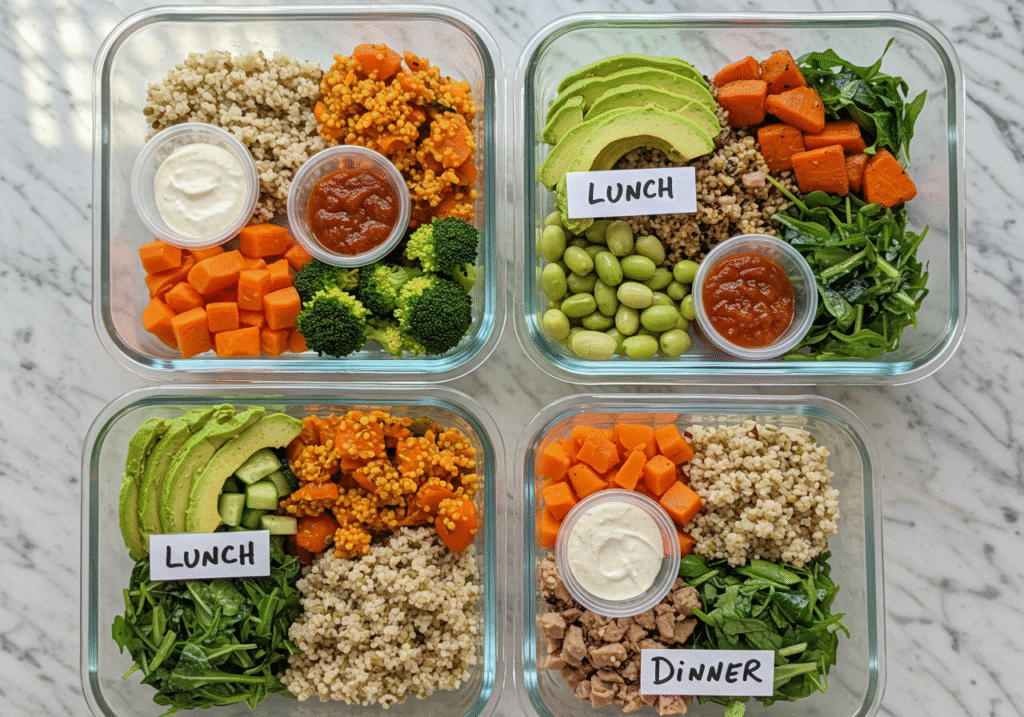
Batch cooking, storage tips, and portion control
One of the most common things I hear from clients is:
“I know what to eat… I just don’t have time to make it every day.”
And my answer? You don’t have to. You just need a plan—and a fridge stocked with the right things.
Here’s how I batch prep my Natural Zepbound Bowl each week:
🥗 Sunday Prep Checklist:
- Grill 2–3 chicken breasts with lemon + sea salt
- Steam 2 cups cauliflower rice + 2 zucchinis, store separately
- Chop cucumbers + parsley (lasts 3–4 days in an airtight jar)
- Make one dressing (like turmeric lemon vinaigrette or tahini-lime)
- Portion out avocado fresh daily or use guac cups if tight on time
- Store in BPA-free glass containers with section dividers
Portion tip:
I always go by ½ protein + ¼ fat + ¼ fiber base. That keeps it light, satisfying, and Zepbound-aligned.
I teach clients to label their containers: “Midday Bowl,” “Light Dinner,” or “Post-Injection Meal.” It helps guide choices when motivation is low but goals are still high.
Time-saving tricks for busy weeks and lazy Sundays
If Sunday prep isn’t your thing, here are some chef shortcuts I use myself when the week gets hectic:
- Frozen riced cauliflower is a lifesaver. Just sauté with olive oil + garlic.
- Buy pre-washed greens and mix in herbs for freshness
- Hard-boil 6 eggs at once and store for up to 5 days
- Use mason jar layers to build your bowl to-go: sauce on bottom, crunchy veg in the middle, greens and protein on top
| Task | Time Saved |
|---|---|
| Pre-cooked protein (chicken, tofu) | 15–20 mins/day |
| Chopped veggies | 10 mins/day |
| Pre-made dressing | 5 mins/meal |
| Total Weekly Time Saved | ~3 hours |
One of my clients with three kids said this approach saved her sanity—and helped her finally drop that stubborn inflammation weight.
Want more simple, satisfying, prep-friendly recipes? Don’t miss our Kale Ginger Detox Smoothie for an energizing breakfast that fits perfectly into your Zepbound plan.
What is a natural Zepbound recipe?
It’s a meal intentionally designed to support your body while on GLP-1 medications like Zepbound. It focuses on whole foods—fiber-rich veggies, clean protein, healthy fats, and hydrating ingredients—that align with your slowed digestion and blood sugar needs. My go-to Zepbound bowl uses ingredients like cauliflower rice, grilled chicken, avocado, and fresh herbs.
Can food really make a difference while on Zepbound?
Absolutely. I’ve seen it firsthand. When your meals match your medication, you experience fewer side effects, more stable energy, and better fat loss. Zepbound sets the stage—your food decides the outcome.
What are the best ingredients to eat with GLP-1 meds?
Start with fiber and hydration: cauliflower, zucchini, cucumber, leafy greens. Add lean proteins like chicken or tofu, and healthy fats like avocado or olive oil. Flavor with herbs and anti-inflammatory spices like turmeric and parsley. Avoid refined carbs and excess sodium.
How often should I eat these meals while taking Zepbound?
I recommend 2 solid meals per day, with optional herbal tea or a light evening broth if you’re still hungry. Space meals 4–6 hours apart and prioritize midday for your largest meal. Always hydrate between meals to support digestion.
Conclusion:
Zepbound gives your metabolism the reset button—but it’s what you eat after you press it that creates lasting change.
By choosing natural Zepbound recipes, you’re not just eating clean—you’re eating smart. You’re saying yes to better digestion, better energy, and real results without sacrifice. This isn’t a diet. It’s a shift. One you can stick with. One your body will thank you for.
Looking for more anti-inflammatory meals and detox teas? Visit our full collection at Healthy Ideas to keep your routine vibrant and clean.
Want more healthy recipes and fat-burning meal ideas? Follow me on Pinterest at Sarah Weight Loss Ideas
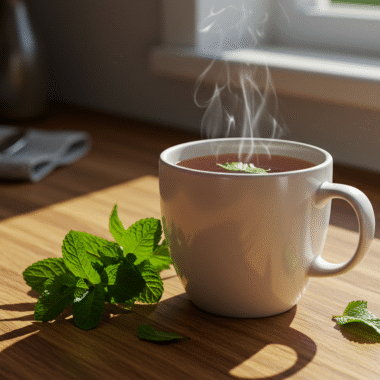
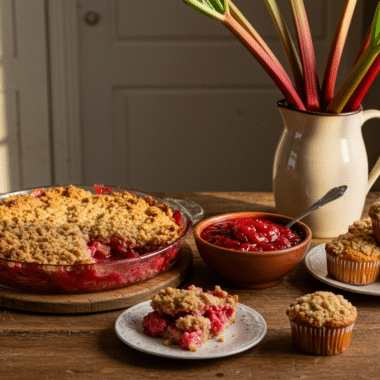




I’m 65 years old and just made this recipe — it’s absolutely perfect! It was easy to follow, light, and refreshing. I feel energized and clean after eating it. I’ve been looking for something simple and healthy, and this hit the mark. Thank you for sharing such a wonderful recipe!
I just turned 59 and gave this recipe a try — and I loved it!
The flavors are so fresh, and it was gentle on my stomach. It’s rare to find something that’s both healthy and delicious. I’ll definitely be making it again. So grateful for recipes like this!